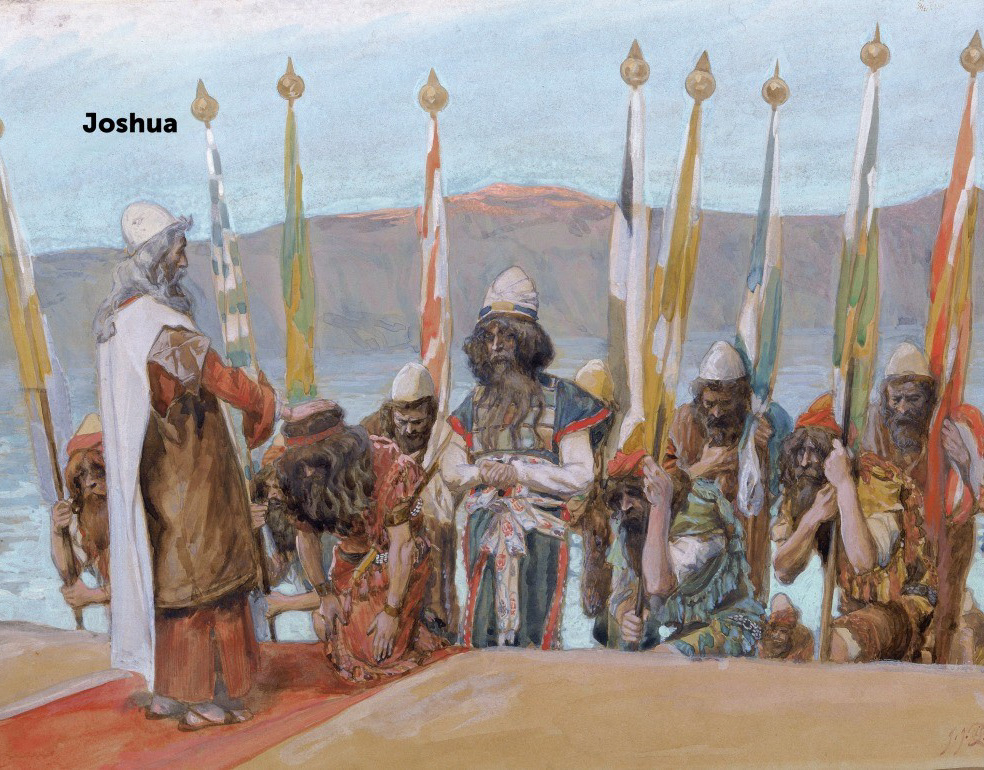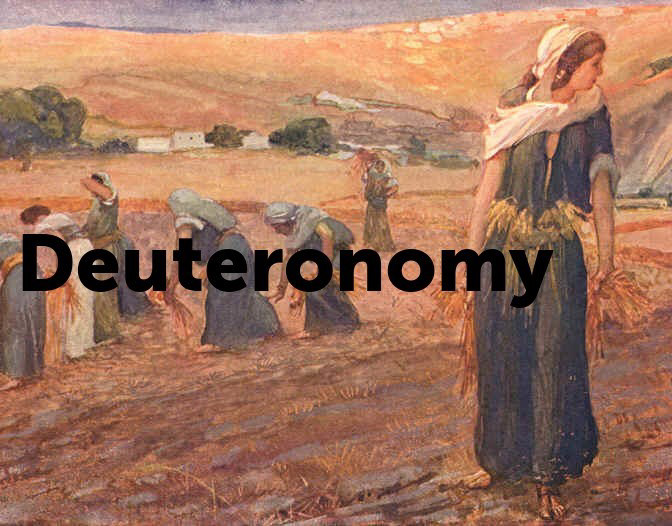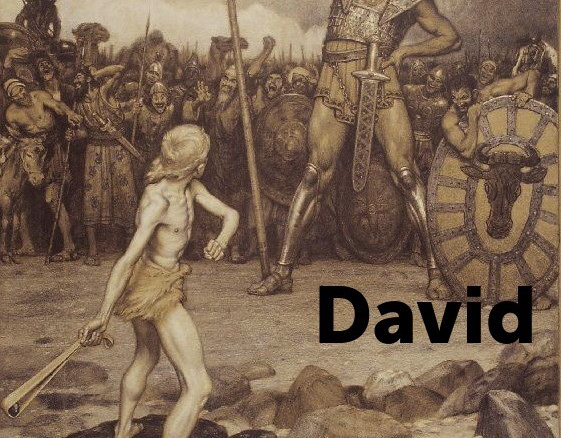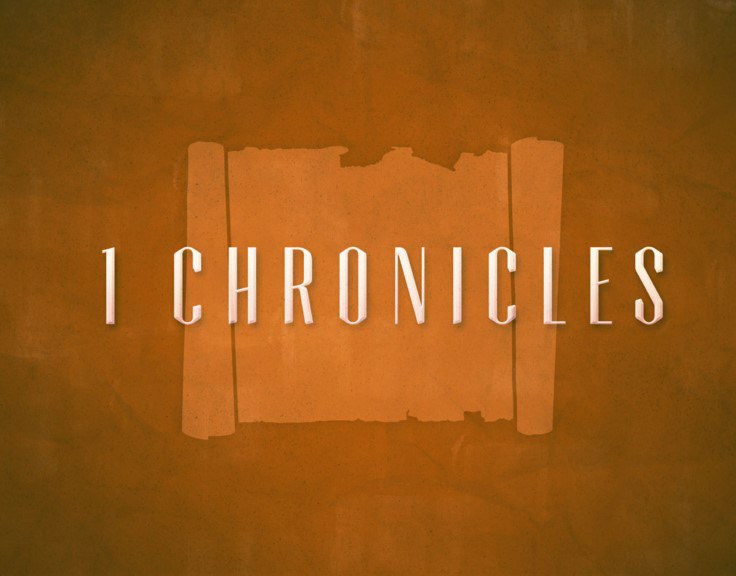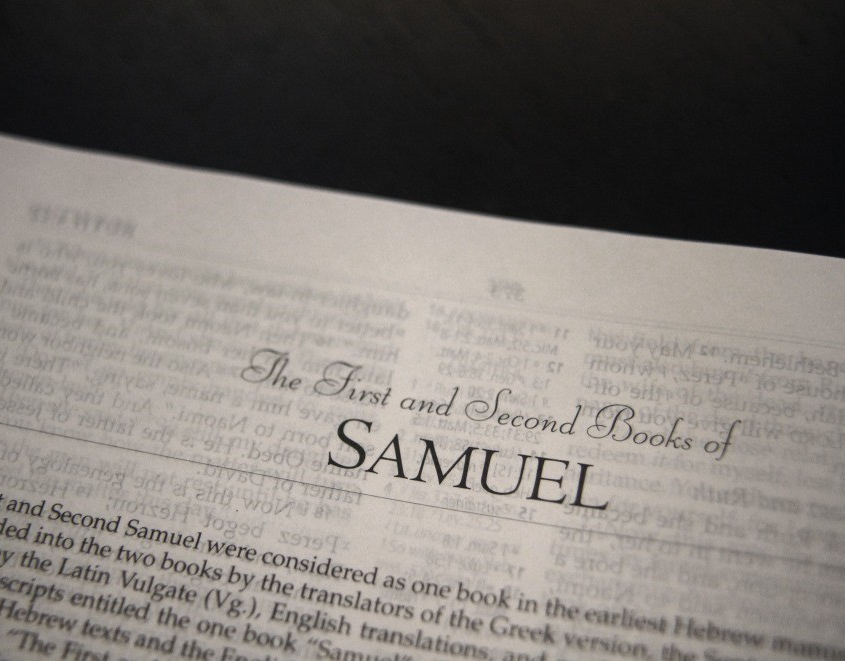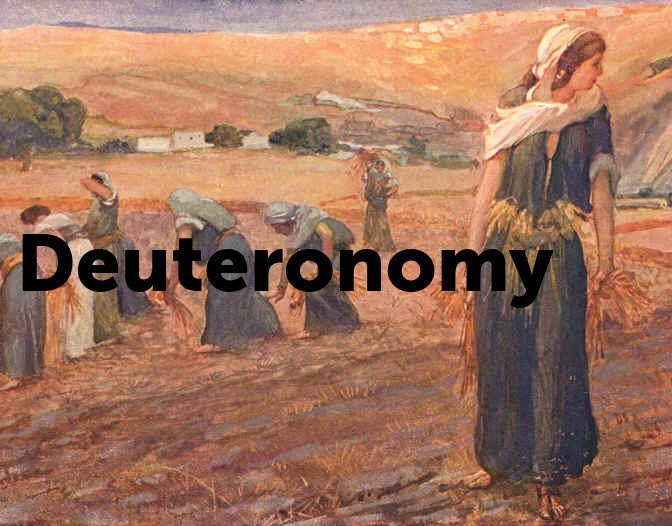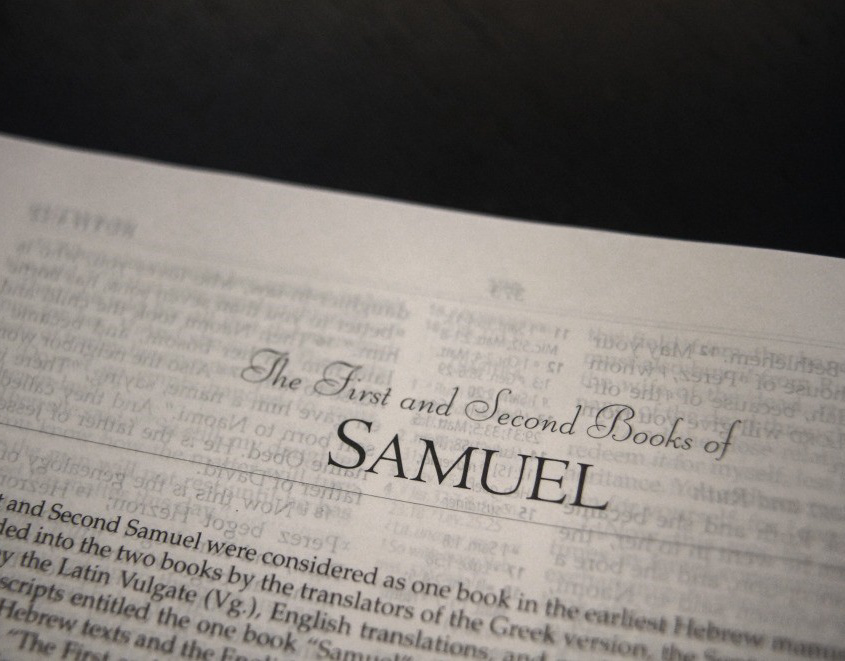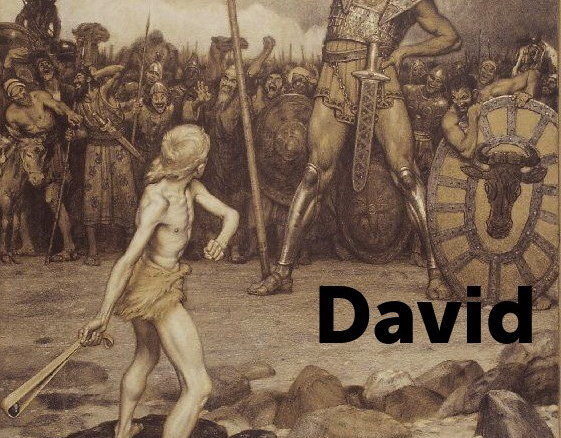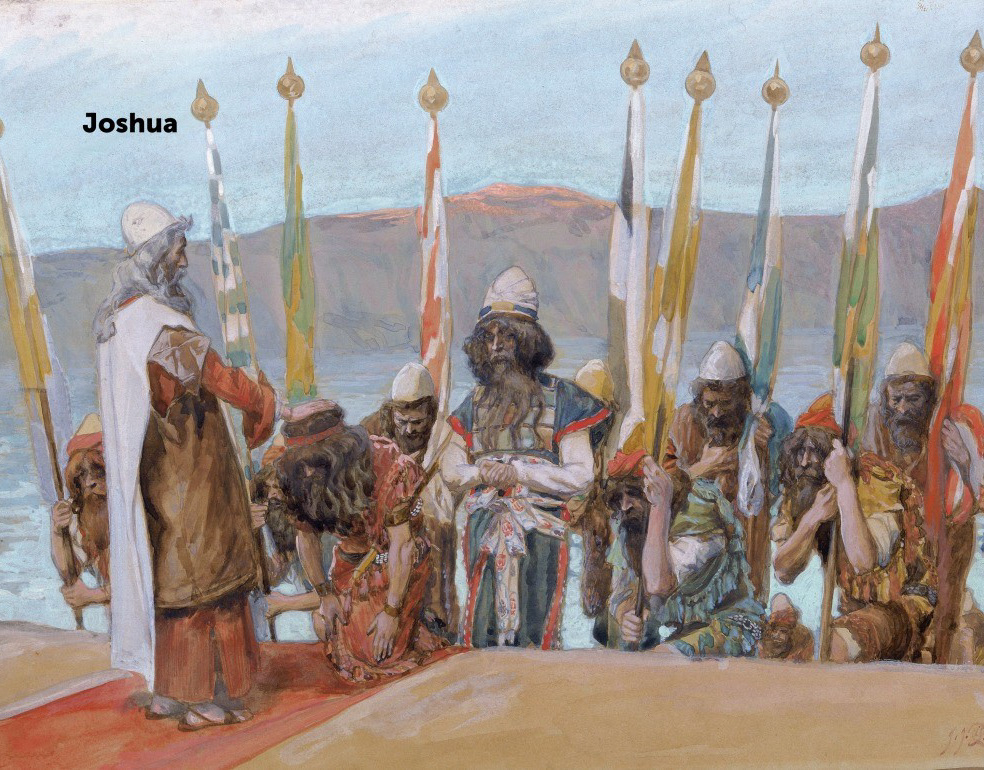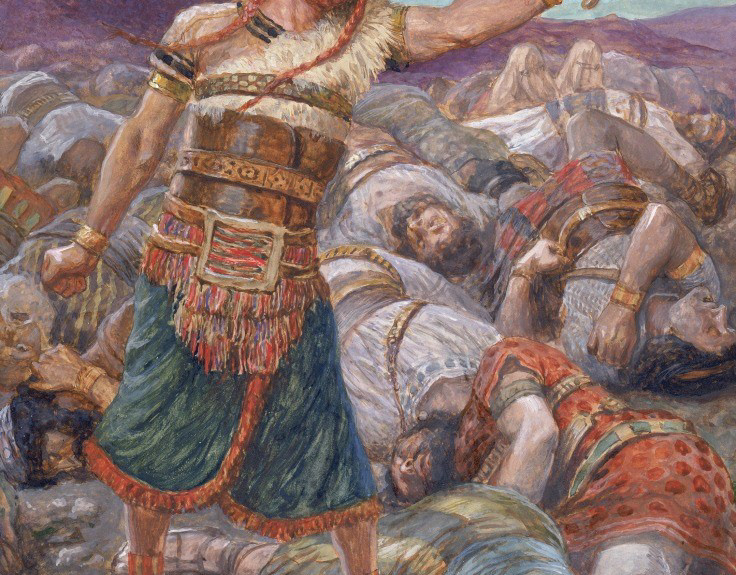Judges 19-21
A Levite and His Concubine
19 In those days, when there was no king in Israel, a certain Levite was sojourning in the remote parts of the hill country of Ephraim, who took to himself a concubine from Bethlehem in Judah. 2 And his concubine was unfaithful to him, and she went away from him to her father’s house at Bethlehem in Judah, and was there some four months. 3 Then her husband arose and went after her, to speak kindly to her and bring her back. He had with him his servant and a couple of donkeys. And she brought him into her father’s house. And when the girl’s father saw him, he came with joy to meet him. 4 And his father-in-law, the girl’s father, made him stay, and he remained with him three days. So they ate and drank and spent the night there. 5 And on the fourth day they arose early in the morning, and he prepared to go, but the girl’s father said to his son-in-law, “Strengthen your heart with a morsel of bread, and after that you may go.” 6 So the two of them sat and ate and drank together. And the girl’s father said to the man, “Be pleased to spend the night, and let your heart be merry.” 7 And when the man rose up to go, his father-in-law pressed him, till he spent the night there again. 8 And on the fifth day he arose early in the morning to depart. And the girl’s father said, “Strengthen your heart and wait until the day declines.” So they ate, both of them. 9 And when the man and his concubine and his servant rose up to depart, his father-in-law, the girl’s father, said to him, “Behold, now the day has waned toward evening. Please, spend the night. Behold, the day draws to its close. Lodge here and let your heart be merry, and tomorrow you shall arise early in the morning for your journey, and go home.”
10 But the man would not spend the night. He rose up and departed and arrived opposite Jebus (that is, Jerusalem). He had with him a couple of saddled donkeys, and his concubine was with him. 11 When they were near Jebus, the day was nearly over, and the servant said to his master, “Come now, let us turn aside to this city of the Jebusites and spend the night in it.” 12 And his master said to him, “We will not turn aside into the city of foreigners, who do not belong to the people of Israel, but we will pass on to Gibeah.” 13 And he said to his young man, “Come and let us draw near to one of these places and spend the night at Gibeah or at Ramah.” 14 So they passed on and went their way. And the sun went down on them near Gibeah, which belongs to Benjamin, 15 and they turned aside there, to go in and spend the night at Gibeah. And he went in and sat down in the open square of the city, for no one took them into his house to spend the night.
16 And behold, an old man was coming from his work in the field at evening. The man was from the hill country of Ephraim, and he was sojourning in Gibeah. The men of the place were Benjaminites. 17 And he lifted up his eyes and saw the traveler in the open square of the city. And the old man said, “Where are you going? And where do you come from?” 18 And he said to him, “We are passing from Bethlehem in Judah to the remote parts of the hill country of Ephraim, from which I come. I went to Bethlehem in Judah, and I am going to the house of the Lord, but no one has taken me into his house. 19 We have straw and feed for our donkeys, with bread and wine for me and your female servant and the young man with your servants. There is no lack of anything.” 20 And the old man said, “Peace be to you; I will care for all your wants. Only, do not spend the night in the square.” 21 So he brought him into his house and gave the donkeys feed. And they washed their feet, and ate and drank.
Gibeah’s Crime
22 As they were making their hearts merry, behold, the men of the city, worthless fellows, surrounded the house, beating on the door. And they said to the old man, the master of the house, “Bring out the man who came into your house, that we may know him.” 23 And the man, the master of the house, went out to them and said to them, “No, my brothers, do not act so wickedly; since this man has come into my house, do not do this vile thing. 24 Behold, here are my virgin daughter and his concubine. Let me bring them out now. Violate them and do with them what seems good to you, but against this man do not do this outrageous thing.” 25 But the men would not listen to him. So the man seized his concubine and made her go out to them. And they knew her and abused her all night until the morning. And as the dawn began to break, they let her go. 26 And as morning appeared, the woman came and fell down at the door of the man’s house where her master was, until it was light.
27 And her master rose up in the morning, and when he opened the doors of the house and went out to go on his way, behold, there was his concubine lying at the door of the house, with her hands on the threshold. 28 He said to her, “Get up, let us be going.” But there was no answer. Then he put her on the donkey, and the man rose up and went away to his home. 29 And when he entered his house, he took a knife, and taking hold of his concubine he divided her, limb by limb, into twelve pieces, and sent her throughout all the territory of Israel. 30 And all who saw it said, “Such a thing has never happened or been seen from the day that the people of Israel came up out of the land of Egypt until this day; consider it, take counsel, and speak.”
Israel’s War with the Tribe of Benjamin
20 Then all the people of Israel came out, from Dan to Beersheba, including the land of Gilead, and the congregation assembled as one man to the Lord at Mizpah. 2 And the chiefs of all the people, of all the tribes of Israel, presented themselves in the assembly of the people of God, 400,000 men on foot that drew the sword. 3 (Now the people of Benjamin heard that the people of Israel had gone up to Mizpah.) And the people of Israel said, “Tell us, how did this evil happen?” 4 And the Levite, the husband of the woman who was murdered, answered and said, “I came to Gibeah that belongs to Benjamin, I and my concubine, to spend the night. 5 And the leaders of Gibeah rose against me and surrounded the house against me by night. They meant to kill me, and they violated my concubine, and she is dead. 6 So I took hold of my concubine and cut her in pieces and sent her throughout all the country of the inheritance of Israel, for they have committed abomination and outrage in Israel. 7 Behold, you people of Israel, all of you, give your advice and counsel here.”
8 And all the people arose as one man, saying, “None of us will go to his tent, and none of us will return to his house. 9 But now this is what we will do to Gibeah: we will go up against it by lot, 10 and we will take ten men of a hundred throughout all the tribes of Israel, and a hundred of a thousand, and a thousand of ten thousand, to bring provisions for the people, that when they come they may repay Gibeah of Benjamin for all the outrage that they have committed in Israel.” 11 So all the men of Israel gathered against the city, united as one man.
12 And the tribes of Israel sent men through all the tribe of Benjamin, saying, “What evil is this that has taken place among you? 13 Now therefore give up the men, the worthless fellows in Gibeah, that we may put them to death and purge evil from Israel.” But the Benjaminites would not listen to the voice of their brothers, the people of Israel. 14 Then the people of Benjamin came together out of the cities to Gibeah to go out to battle against the people of Israel. 15 And the people of Benjamin mustered out of their cities on that day 26,000 men who drew the sword, besides the inhabitants of Gibeah, who mustered 700 chosen men. 16 Among all these were 700 chosen men who were left-handed; every one could sling a stone at a hair and not miss. 17 And the men of Israel, apart from Benjamin, mustered 400,000 men who drew the sword; all these were men of war.
18 The people of Israel arose and went up to Bethel and inquired of God, “Who shall go up first for us to fight against the people of Benjamin?” And the Lord said, “Judah shall go up first.”
19 Then the people of Israel rose in the morning and encamped against Gibeah. 20 And the men of Israel went out to fight against Benjamin, and the men of Israel drew up the battle line against them at Gibeah. 21 The people of Benjamin came out of Gibeah and destroyed on that day 22,000 men of the Israelites. 22 But the people, the men of Israel, took courage, and again formed the battle line in the same place where they had formed it on the first day. 23 And the people of Israel went up and wept before the Lord until the evening. And they inquired of the Lord, “Shall we again draw near to fight against our brothers, the people of Benjamin?” And the Lord said, “Go up against them.”
24 So the people of Israel came near against the people of Benjamin the second day. 25 And Benjamin went against them out of Gibeah the second day, and destroyed 18,000 men of the people of Israel. All these were men who drew the sword. 26 Then all the people of Israel, the whole army, went up and came to Bethel and wept. They sat there before the Lord and fasted that day until evening, and offered burnt offerings and peace offerings before the Lord. 27 And the people of Israel inquired of the Lord (for the ark of the covenant of God was there in those days, 28 and Phinehas the son of Eleazar, son of Aaron, ministered before it in those days), saying, “Shall we go out once more to battle against our brothers, the people of Benjamin, or shall we cease?” And the Lord said, “Go up, for tomorrow I will give them into your hand.”
29 So Israel set men in ambush around Gibeah. 30 And the people of Israel went up against the people of Benjamin on the third day and set themselves in array against Gibeah, as at other times. 31 And the people of Benjamin went out against the people and were drawn away from the city. And as at other times they began to strike and kill some of the people in the highways, one of which goes up to Bethel and the other to Gibeah, and in the open country, about thirty men of Israel. 32 And the people of Benjamin said, “They are routed before us, as at the first.” But the people of Israel said, “Let us flee and draw them away from the city to the highways.” 33 And all the men of Israel rose up out of their place and set themselves in array at Baal-tamar, and the men of Israel who were in ambush rushed out of their place from Maareh-geba. 34 And there came against Gibeah 10,000 chosen men out of all Israel, and the battle was hard, but the Benjaminites did not know that disaster was close upon them. 35 And the Lord defeated Benjamin before Israel, and the people of Israel destroyed 25,100 men of Benjamin that day. All these were men who drew the sword. 36 So the people of Benjamin saw that they were defeated.
The men of Israel gave ground to Benjamin, because they trusted the men in ambush whom they had set against Gibeah. 37 Then the men in ambush hurried and rushed against Gibeah; the men in ambush moved out and struck all the city with the edge of the sword. 38 Now the appointed signal between the men of Israel and the men in the main ambush was that when they made a great cloud of smoke rise up out of the city 39 the men of Israel should turn in battle. Now Benjamin had begun to strike and kill about thirty men of Israel. They said, “Surely they are defeated before us, as in the first battle.” 40 But when the signal began to rise out of the city in a column of smoke, the Benjaminites looked behind them, and behold, the whole of the city went up in smoke to heaven. 41 Then the men of Israel turned, and the men of Benjamin were dismayed, for they saw that disaster was close upon them. 42 Therefore they turned their backs before the men of Israel in the direction of the wilderness, but the battle overtook them. And those who came out of the cities were destroying them in their midst. 43 Surrounding the Benjaminites, they pursued them and trod them down from Nohah as far as opposite Gibeah on the east. 44 Eighteen thousand men of Benjamin fell, all of them men of valor. 45 And they turned and fled toward the wilderness to the rock of Rimmon. Five thousand men of them were cut down in the highways. And they were pursued hard to Gidom, and 2,000 men of them were struck down. 46 So all who fell that day of Benjamin were 25,000 men who drew the sword, all of them men of valor. 47 But 600 men turned and fled toward the wilderness to the rock of Rimmon and remained at the rock of Rimmon four months. 48 And the men of Israel turned back against the people of Benjamin and struck them with the edge of the sword, the city, men and beasts and all that they found. And all the towns that they found they set on fire.
Wives Provided for the Tribe of Benjamin
21 Now the men of Israel had sworn at Mizpah, “No one of us shall give his daughter in marriage to Benjamin.” 2 And the people came to Bethel and sat there till evening before God, and they lifted up their voices and wept bitterly. 3 And they said, “O Lord, the God of Israel, why has this happened in Israel, that today there should be one tribe lacking in Israel?” 4 And the next day the people rose early and built there an altar and offered burnt offerings and peace offerings. 5 And the people of Israel said, “Which of all the tribes of Israel did not come up in the assembly to the Lord?” For they had taken a great oath concerning him who did not come up to the Lord to Mizpah, saying, “He shall surely be put to death.” 6 And the people of Israel had compassion for Benjamin their brother and said, “One tribe is cut off from Israel this day. 7 What shall we do for wives for those who are left, since we have sworn by the Lord that we will not give them any of our daughters for wives?”
8 And they said, “What one is there of the tribes of Israel that did not come up to the Lord to Mizpah?” And behold, no one had come to the camp from Jabesh-gilead, to the assembly. 9 For when the people were mustered, behold, not one of the inhabitants of Jabesh-gilead was there. 10 So the congregation sent 12,000 of their bravest men there and commanded them, “Go and strike the inhabitants of Jabesh-gilead with the edge of the sword; also the women and the little ones. 11 This is what you shall do: every male and every woman that has lain with a male you shall devote to destruction.” 12 And they found among the inhabitants of Jabesh-gilead 400 young virgins who had not known a man by lying with him, and they brought them to the camp at Shiloh, which is in the land of Canaan.
13 Then the whole congregation sent word to the people of Benjamin who were at the rock of Rimmon and proclaimed peace to them. 14 And Benjamin returned at that time. And they gave them the women whom they had saved alive of the women of Jabesh-gilead, but they were not enough for them. 15 And the people had compassion on Benjamin because the Lord had made a breach in the tribes of Israel.
16 Then the elders of the congregation said, “What shall we do for wives for those who are left, since the women are destroyed out of Benjamin?” 17 And they said, “There must be an inheritance for the survivors of Benjamin, that a tribe not be blotted out from Israel. 18 Yet we cannot give them wives from our daughters.” For the people of Israel had sworn, “Cursed be he who gives a wife to Benjamin.” 19 So they said, “Behold, there is the yearly feast of the Lord at Shiloh, which is north of Bethel, on the east of the highway that goes up from Bethel to Shechem, and south of Lebonah.” 20 And they commanded the people of Benjamin, saying, “Go and lie in ambush in the vineyards 21 and watch. If the daughters of Shiloh come out to dance in the dances, then come out of the vineyards and snatch each man his wife from the daughters of Shiloh, and go to the land of Benjamin. 22 And when their fathers or their brothers come to complain to us, we will say to them, ‘Grant them graciously to us, because we did not take for each man of them his wife in battle, neither did you give them to them, else you would now be guilty.’ ” 23 And the people of Benjamin did so and took their wives, according to their number, from the dancers whom they carried off. Then they went and returned to their inheritance and rebuilt the towns and lived in them. 24 And the people of Israel departed from there at that time, every man to his tribe and family, and they went out from there every man to his inheritance.
25 In those days there was no king in Israel. Everyone did what was right in his own eyes. [1]
Ruth 1-4
Naomi Widowed
1 In the days when the judges ruled there was a famine in the land, and a man of Bethlehem in Judah went to sojourn in the country of Moab, he and his wife and his two sons. 2 The name of the man was Elimelech and the name of his wife Naomi, and the names of his two sons were Mahlon and Chilion. They were Ephrathites from Bethlehem in Judah. They went into the country of Moab and remained there. 3 But Elimelech, the husband of Naomi, died, and she was left with her two sons. 4 These took Moabite wives; the name of the one was Orpah and the name of the other Ruth. They lived there about ten years, 5 and both Mahlon and Chilion died, so that the woman was left without her two sons and her husband.
Ruth’s Loyalty to Naomi
6 Then she arose with her daughters-in-law to return from the country of Moab, for she had heard in the fields of Moab that the Lord had visited his people and given them food. 7 So she set out from the place where she was with her two daughters-in-law, and they went on the way to return to the land of Judah. 8 But Naomi said to her two daughters-in-law, “Go, return each of you to her mother’s house. May the Lord deal kindly with you, as you have dealt with the dead and with me. 9 The Lord grant that you may find rest, each of you in the house of her husband!” Then she kissed them, and they lifted up their voices and wept. 10 And they said to her, “No, we will return with you to your people.” 11 But Naomi said, “Turn back, my daughters; why will you go with me? Have I yet sons in my womb that they may become your husbands? 12 Turn back, my daughters; go your way, for I am too old to have a husband. If I should say I have hope, even if I should have a husband this night and should bear sons, 13 would you therefore wait till they were grown? Would you therefore refrain from marrying? No, my daughters, for it is exceedingly bitter to me for your sake that the hand of the Lord has gone out against me.” 14 Then they lifted up their voices and wept again. And Orpah kissed her mother-in-law, but Ruth clung to her.
15 And she said, “See, your sister-in-law has gone back to her people and to her gods; return after your sister-in-law.” 16 But Ruth said, “Do not urge me to leave you or to return from following you. For where you go I will go, and where you lodge I will lodge. Your people shall be my people, and your God my God. 17 Where you die I will die, and there will I be buried. May the Lord do so to me and more also if anything but death parts me from you.” 18 And when Naomi saw that she was determined to go with her, she said no more.
Naomi and Ruth Return
19 So the two of them went on until they came to Bethlehem. And when they came to Bethlehem, the whole town was stirred because of them. And the women said, “Is this Naomi?” 20 She said to them, “Do not call me Naomi; call me Mara, for the Almighty has dealt very bitterly with me. 21 I went away full, and the Lord has brought me back empty. Why call me Naomi, when the Lord has testified against me and the Almighty has brought calamity upon me?”
22 So Naomi returned, and Ruth the Moabite her daughter-in-law with her, who returned from the country of Moab. And they came to Bethlehem at the beginning of barley harvest.
Ruth Meets Boaz
2 Now Naomi had a relative of her husband’s, a worthy man of the clan of Elimelech, whose name was Boaz. 2 And Ruth the Moabite said to Naomi, “Let me go to the field and glean among the ears of grain after him in whose sight I shall find favor.” And she said to her, “Go, my daughter.” 3 So she set out and went and gleaned in the field after the reapers, and she happened to come to the part of the field belonging to Boaz, who was of the clan of Elimelech. 4 And behold, Boaz came from Bethlehem. And he said to the reapers, “The Lord be with you!” And they answered, “The Lord bless you.” 5 Then Boaz said to his young man who was in charge of the reapers, “Whose young woman is this?” 6 And the servant who was in charge of the reapers answered, “She is the young Moabite woman, who came back with Naomi from the country of Moab. 7 She said, ‘Please let me glean and gather among the sheaves after the reapers.’ So she came, and she has continued from early morning until now, except for a short rest.”
8 Then Boaz said to Ruth, “Now, listen, my daughter, do not go to glean in another field or leave this one, but keep close to my young women. 9 Let your eyes be on the field that they are reaping, and go after them. Have I not charged the young men not to touch you? And when you are thirsty, go to the vessels and drink what the young men have drawn.” 10 Then she fell on her face, bowing to the ground, and said to him, “Why have I found favor in your eyes, that you should take notice of me, since I am a foreigner?” 11 But Boaz answered her, “All that you have done for your mother-in-law since the death of your husband has been fully told to me, and how you left your father and mother and your native land and came to a people that you did not know before. 12 The Lord repay you for what you have done, and a full reward be given you by the Lord, the God of Israel, under whose wings you have come to take refuge!” 13 Then she said, “I have found favor in your eyes, my lord, for you have comforted me and spoken kindly to your servant, though I am not one of your servants.”
14 And at mealtime Boaz said to her, “Come here and eat some bread and dip your morsel in the wine.” So she sat beside the reapers, and he passed to her roasted grain. And she ate until she was satisfied, and she had some left over. 15 When she rose to glean, Boaz instructed his young men, saying, “Let her glean even among the sheaves, and do not reproach her. 16 And also pull out some from the bundles for her and leave it for her to glean, and do not rebuke her.”
17 So she gleaned in the field until evening. Then she beat out what she had gleaned, and it was about an ephah of barley. 18 And she took it up and went into the city. Her mother-in-law saw what she had gleaned. She also brought out and gave her what food she had left over after being satisfied. 19 And her mother-in-law said to her, “Where did you glean today? And where have you worked? Blessed be the man who took notice of you.” So she told her mother-in-law with whom she had worked and said, “The man’s name with whom I worked today is Boaz.” 20 And Naomi said to her daughter-in-law, “May he be blessed by the Lord, whose kindness has not forsaken the living or the dead!” Naomi also said to her, “The man is a close relative of ours, one of our redeemers.” 21 And Ruth the Moabite said, “Besides, he said to me, ‘You shall keep close by my young men until they have finished all my harvest.’ ” 22 And Naomi said to Ruth, her daughter-in-law, “It is good, my daughter, that you go out with his young women, lest in another field you be assaulted.” 23 So she kept close to the young women of Boaz, gleaning until the end of the barley and wheat harvests. And she lived with her mother-in-law.
Ruth and Boaz at the Threshing Floor
3 Then Naomi her mother-in-law said to her, “My daughter, should I not seek rest for you, that it may be well with you? 2 Is not Boaz our relative, with whose young women you were? See, he is winnowing barley tonight at the threshing floor. 3 Wash therefore and anoint yourself, and put on your cloak and go down to the threshing floor, but do not make yourself known to the man until he has finished eating and drinking. 4 But when he lies down, observe the place where he lies. Then go and uncover his feet and lie down, and he will tell you what to do.” 5 And she replied, “All that you say I will do.”
6 So she went down to the threshing floor and did just as her mother-in-law had commanded her. 7 And when Boaz had eaten and drunk, and his heart was merry, he went to lie down at the end of the heap of grain. Then she came softly and uncovered his feet and lay down. 8 At midnight the man was startled and turned over, and behold, a woman lay at his feet! 9 He said, “Who are you?” And she answered, “I am Ruth, your servant. Spread your wings over your servant, for you are a redeemer.” 10 And he said, “May you be blessed by the Lord, my daughter. You have made this last kindness greater than the first in that you have not gone after young men, whether poor or rich. 11 And now, my daughter, do not fear. I will do for you all that you ask, for all my fellow townsmen know that you are a worthy woman. 12 And now it is true that I am a redeemer. Yet there is a redeemer nearer than I. 13 Remain tonight, and in the morning, if he will redeem you, good; let him do it. But if he is not willing to redeem you, then, as the Lord lives, I will redeem you. Lie down until the morning.”
14 So she lay at his feet until the morning, but arose before one could recognize another. And he said, “Let it not be known that the woman came to the threshing floor.” 15 And he said, “Bring the garment you are wearing and hold it out.” So she held it, and he measured out six measures of barley and put it on her. Then she went into the city. 16 And when she came to her mother-in-law, she said, “How did you fare, my daughter?” Then she told her all that the man had done for her, 17 saying, “These six measures of barley he gave to me, for he said to me, ‘You must not go back empty-handed to your mother-in-law.’ ” 18 She replied, “Wait, my daughter, until you learn how the matter turns out, for the man will not rest but will settle the matter today.”
Boaz Redeems Ruth
4 Now Boaz had gone up to the gate and sat down there. And behold, the redeemer, of whom Boaz had spoken, came by. So Boaz said, “Turn aside, friend; sit down here.” And he turned aside and sat down. 2 And he took ten men of the elders of the city and said, “Sit down here.” So they sat down. 3 Then he said to the redeemer, “Naomi, who has come back from the country of Moab, is selling the parcel of land that belonged to our relative Elimelech. 4 So I thought I would tell you of it and say, ‘Buy it in the presence of those sitting here and in the presence of the elders of my people.’ If you will redeem it, redeem it. But if you will not, tell me, that I may know, for there is no one besides you to redeem it, and I come after you.” And he said, “I will redeem it.” 5 Then Boaz said, “The day you buy the field from the hand of Naomi, you also acquire Ruth the Moabite, the widow of the dead, in order to perpetuate the name of the dead in his inheritance.” 6 Then the redeemer said, “I cannot redeem it for myself, lest I impair my own inheritance. Take my right of redemption yourself, for I cannot redeem it.”
7 Now this was the custom in former times in Israel concerning redeeming and exchanging: to confirm a transaction, the one drew off his sandal and gave it to the other, and this was the manner of attesting in Israel. 8 So when the redeemer said to Boaz, “Buy it for yourself,” he drew off his sandal. 9 Then Boaz said to the elders and all the people, “You are witnesses this day that I have bought from the hand of Naomi all that belonged to Elimelech and all that belonged to Chilion and to Mahlon. 10 Also Ruth the Moabite, the widow of Mahlon, I have bought to be my wife, to perpetuate the name of the dead in his inheritance, that the name of the dead may not be cut off from among his brothers and from the gate of his native place. You are witnesses this day.” 11 Then all the people who were at the gate and the elders said, “We are witnesses. May the Lord make the woman, who is coming into your house, like Rachel and Leah, who together built up the house of Israel. May you act worthily in Ephrathah and be renowned in Bethlehem, 12 and may your house be like the house of Perez, whom Tamar bore to Judah, because of the offspring that the Lord will give you by this young woman.”
Ruth and Boaz Marry
13 So Boaz took Ruth, and she became his wife. And he went in to her, and the Lord gave her conception, and she bore a son. 14 Then the women said to Naomi, “Blessed be the Lord, who has not left you this day without a redeemer, and may his name be renowned in Israel! 15 He shall be to you a restorer of life and a nourisher of your old age, for your daughter-in-law who loves you, who is more to you than seven sons, has given birth to him.” 16 Then Naomi took the child and laid him on her lap and became his nurse. 17 And the women of the neighborhood gave him a name, saying, “A son has been born to Naomi.” They named him Obed. He was the father of Jesse, the father of David.
The Genealogy of David
18 Now these are the generations of Perez: Perez fathered Hezron, 19 Hezron fathered Ram, Ram fathered Amminadab, 20 Amminadab fathered Nahshon, Nahshon fathered Salmon, 21 Salmon fathered Boaz, Boaz fathered Obed, 22 Obed fathered Jesse, and Jesse fathered David. [2]
Thoughts:
The final 3 chapters of Judges is hard reading. 21:25 states it best “In those days there was no king in Israel. Everyone did what was right in his own eyes.” [3] Starting in Ch. 19 we see a Levite who forgives his Concubine (which was probably more like a wife who was not “betrothed” to him) who had been unfaithful. He goes to speak kindly and bring her back. The father is no doubt overjoyed at the prospect of reconciliation and keeps the Levite there longer then intended, with haste the man leaves too late in the day. Seeking to avoid what might be safer places to be closer to his kinsmen he presses on to the city of Gibeah of the tribe of Benjamin. No one offers him kindness except this old man who apparently knows the square is not safe. Later as the old man is being a good host some men come to do some most horrible things as 19:22 says “know him,” i.e. have sex with him. It could be easy only to see this as a condemnation of homosexuality, but it is not. The old man offers the women of the house, even his own daughter, a virgin, to protect his guest. Eventually they take the concubine and the detail of what is done is horrific. We think maybe the husband was not as great a man as we originally thought, but still he attempts to take her home (not abandon her) realizing what a awful thing this was. I looked at one commentary that said even if the man had forgiven her God had exacted the penalty for her sin against him (namely lust for lust)… but this is not the God we know. By forgiving her and speaking kindly to her, traveling to bring her home, this man acted as God would have us act. If then he had forgiven her, why would God choose to punish her now? Does this mean that although we are forgiven in Christ we are still due punishment? Absolutely not! And I would challenge any prosperity gospel pharisee to show how that is in the character of God (needless to say I wont be looking at his commentaries anymore). I think rather we see some mistakes in the mans ethnocentrism in pushing on to his own people and avoiding the Jebusite's who were probably safer. We also see as we did in Job that bad things do indeed happen to good people, and often when we least expect it. It also shows that not all the house of Israel, (i.e. the church) is saved. We see that this woman has died, and the man takes her home and does what could be seen as dastardly himself in cutting her up and sending the pieces throughout Israel. Scripture often uses harsh words and harsh examples to get us to see the point because we are just so clueless sometimes, this was a powerful way to address his people who he had felt so wronged by. Israel responds and sets out after the men who did this in force but the tribe of Benjamin protects these evil men. How often do we look beyond sin and justify those close to us, joining together to making something wrong even worse on the victim? To be fair maybe you or I have never opposed something to this extent, yet the idea is the same, even for those little things we try to justify, I wonder how we would feel if the rest of Israel had said “this is not our fight,” as we often do with atrocities all over the world. Benjamin must have been a great tribe of warriors facing 400,000 Israelite's to their own 26,000 and winning the first 2 engagements. This infighting ceases the third round as the Lord gives Israel victory to the point of decimating the tribe of Benjamin. Peace ensues with the 600 men left and though through questionable means wives are found for them to continue although cut off from the rest of Israel. The Judges were put in place to lead Israel after repentance and we rightly ask why is this story found in the book, where is the judge? Might I offer up that the forgiven concubine was… there is a line in the chronicles of Narnia that says “things never happen the same way twice,” it is easy to read though the ridiculousness of the people of Israel until we see these last few chapters, showing us that God sometimes allows things, hard things, to spark us, his people to action, and the further lost we are the harder the reconciliation. In Christ case he was crucified a death that created a whole new word for pain (excruciating). Will we respond with the fervor of Israel in following him our Judge?
The book of Ruth is an amazing story after such an account as found in Judges. First Ruth is not only a woman (not highly favored in the culture) but a Moabite (not highly favored among the children of God). “The book of Ruth demonstrates that God works out His plan of salvation in spite of all opposition, real or apparent. While Israel thought that God was for them and against their neighbors, God had intended to extend salvation to their neighbors through Israel. If Israel thought that foreigners were inherently excluded from God’s favor and incapable of saving faith, Ruth exposes the error of their thinking. Thus, Ruth re-orients the reader to understand that God desires all people to be saved and come to the knowledge of the truth (1 Tim 2:4).”[4] Ruth is a difficult book to date, it mentions David but lists Jesse the father of David as a decendent, therefore many believe Samuel may have authored the book as he anointed David but was born during the time of the Judges, thus giving us a proposed date of around 1100 BC.
We see the major themes of this book as the faithfulness of God, “God provided food for people by way of gleaning the fields and He provided for their other needs by way of a kinsman-redeemer.”[5] We also see that Gods people reflect his faithfulness in the acts of Naomi, Ruth loyalty to Naomi, and Boaz’s greetings and care. We also see the genealogical line from Perez, in Genesis 38, to David at the end of the book. “The history of humanity from its creation until its redemption by Jesus Christ is a messy business. Many of the men in the line from Eve to Mary were intensely faithful, like Noah and Abraham. Many judges were faithful as were many of the kings. On the other hand, many were scoundrels like Lamech (Gen 4:23–24) and Ham (Gen 9:21–27). Many judges and kings were also faithless. Nevertheless, the Lord continued to order history so that His promise of a Savior was fulfilled at just the right time (Gal 4:4). This history also demonstrates that God has those considered to be foreigners in mind, includes them in His purposes, and even uses them to remind us that faith, not physical descent, makes someone a child of God (John 1:11–14).”[6]
[1] The Holy Bible: English Standard Version (Wheaton, IL: Crossway Bibles, 2016), Jdg 19:1–21:25.
[2] The Holy Bible: English Standard Version (Wheaton, IL: Crossway Bibles, 2016), Ru 1:1–4:22.
[3] The Holy Bible: English Standard Version (Wheaton, IL: Crossway Bibles, 2016), Jdg 21:25.
[4] Andrew E. Steinmann, Michael Eschelbach, et al., Called to Be God’s People: An Introduction to the Old Testament, ed. Andrew E. Steinmann, vol. 1, Called by the Gospel (Eugene, OR: Wipf & Stock Publishers, 2006), 249.
[5] Andrew E. Steinmann, Michael Eschelbach, et al., Called to Be God’s People: An Introduction to the Old Testament, ed. Andrew E. Steinmann, vol. 1, Called by the Gospel (Eugene, OR: Wipf & Stock Publishers, 2006), 251.
[6] Andrew E. Steinmann, Michael Eschelbach, et al., Called to Be God’s People: An Introduction to the Old Testament, ed. Andrew E. Steinmann, vol. 1, Called by the Gospel (Eugene, OR: Wipf & Stock Publishers, 2006), 253.
